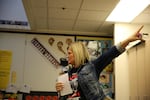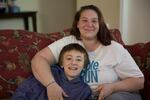Ethan likes to make up stories and use his imagination. So coming up with an idea for a story for his sixth-grade writing class was no problem.
“It’s about these caterpillars and they have the ability to transform into human," Ethan explained. "Like, they merge together and become human."
But actually organizing his thoughts into an essay, and going through the methodical process of writing and revising, is not so easy. It's just one aspect of school that's tough for Ethan.
Ethan is part of OPB's Class Of 2025 project, a multi-year effort to follow 27 Oregon students from elementary school through high school graduation. Among the biggest barriers for kids are problems outside of school. Many children have endured trauma of various kinds, and that can lead to emotional, behavioral and other types of challenges as they advance through school.
Ethan’s family lost their home two and a half years ago when they realized the air inside was toxic because it used to be a drug lab.
They moved in and out of friends’ houses, motel rooms and a shelter, where Ethan's mother, Melissa, met a boyfriend who became abusive. Children who endure traumas such as domestic abuse and family instability are far less likely to graduate than those who haven’t.

Beaverton teacher Ashley Wilson points to descriptive words for her sixth grade students to consider as they're interpreting an essay. Wilson is the teacher of Class Of 2025 student Ethan.
Rob Manning / OPB
Two years ago, Melissa pulled Ethan out of school in the middle of the day to escape the abuse. They ended up in a domestic violence shelter. It was the safe and secure place Melissa needed, but she says it wasn’t ideal for her kids.
Read More: How A Sense Of Control Can Help Students With Childhood Trauma
“It’s a confidential location, so can’t have company over or anything, even though it’s a regular house — which was really difficult for the kids,” Melissa said recently.
Ethan moved from Beaverton to Southeast Portland about a year ago to live with his father, though they didn't know each other well. He attended the local school, Whitman Elementary. It was Ethan’s favorite out of the five schools he attended in less than two years.
“In my opinion, Whitman is better because my teacher helped me more," Ethan said. "We still went on with the lessons, but instead of everybody moving on, some people would stay behind a little — and then if they still can’t figure out, she would teach us different strategies.”

Class Of 2025 student Ethan sits with his mother Melissa in the living room of their Beaverton apartment. The family was homeless for more than two years before finding an apartment in fall 2018.
Rob Manning / OPB
His teacher, Melissa Ortiz, remembered Ethan as a sweet and smart boy who was dealing with a lot. Ortiz said that because Ethan started Whitman partway through the school year, she became his first friend. She kept an eye on him and would talk with him during recess. And academically, he needed a little support.
Related: Oregon Teachers Call For Solutions To Disruptive Student Problems
“He often would need a little extra time, and just some extra love, really,” Ortiz said.
More and more, Oregon teachers such as Ortiz are focusing on students’ emotional needs, especially for children who have suffered some kind of trauma — like Ethan.
“It’s just something you have to recognize, that they’re 10 and they’re here to learn, but they’re also humans," Ortiz said. "And they have some baggage and some things that don’t just stop at the door.”
Ortiz said that Ethan made friends and grew more independent as the school year went on. Then fifth grade ended, and Ethan moved across the region again to Beaverton, to live with Melissa and his sister in a new apartment.

Class Of 2025 student Ethan works on a project with his sixth-grade classmates at a Beaverton middle school drama class.
Rob Manning / OPB
Ethan wore a shy grin as he showed off his room.
“All right, so this is my chair. It has clothes on it," he said. "My dresser, my desk, my monitor, my bed ... "
Melissa can afford the place on her limited income thanks to a county housing program. This should be home for a while. It’s hard for her to believe.
"[I'm] very anxious, because I don’t know if it’s going to be somehow snatched away," Melissa said recently. "But very happy. The kids are happy.”
The move meant Ethan switched schools, again.
Part of Ethan's school situation, Melissa notes, is that he has been behind for some time. Before they were homeless, when Ethan was 7, 8, 9 years old, Melissa home-schooled him. By the time he returned to school in fourth grade, she estimates he was a full grade level behind — but he would be pushed into class with kids his own age.

Class Of 2025 student Ethan's sixth grade math class at a Beaverton middle school.
Rob Manning / OPB
This year's change is a big one, from a cozy fifth-grade classroom at Whitman Elementary to the constant classroom changes at a big Beaverton middle school.
Ethan likes the electives and enjoys working on his school Chromebook. But keeping organized is a struggle. He tends to forget to finish his homework or hand it in on time. Seemingly little things, like keeping track of a slip of paper to get it signed by each teacher, can be a big challenge.
“I lost my ticket for the party," Ethan said. "I have to find it — it’s part of the being responsible thing.”
The “being responsible thing” is hard for many middle schoolers. But Ethan has been through trauma. On top of struggling with details, Ethan tends to hide. His teachers say he's the opposite of disruptive, declining to ask questions or volunteer answers in class.
“Is he a kid that really pops up on my radar as a kid that really struggles? No," said Ethan's writing teacher, Ashley Wilson. "But when Mom started talking about things, I can see it’s at least worth looking into."
Ethan’s mom suspects her son might have attention deficit disorder and might need special education.
Ethan’s old teacher, Melissa Ortiz at Whitman, sees a different deficit. She used to teach middle school, and she knows it can be hard to make connections with dozens of students in a given semester. But Ortiz said teachers should pay more attention to kids like Ethan.
“It’s not impossible," she said. "It’s just someone has to care enough. Someone has to say, ‘Yeah, my job is very intense, and I have a lot of grading, and a lot of kids in one day, but I have to make an effort to connect with them on a human level.'”
Schools have prioritized social-emotional learning in recent years, with more teacher training. But in Oregon’s chronically underfunded schools, meeting those needs remains really difficult, for children like Ethan who’ve been through trauma.
This is Part 1 of 2 in a Class of 2025 series on childhood trauma in the classroom. Read Dale’s story here.

